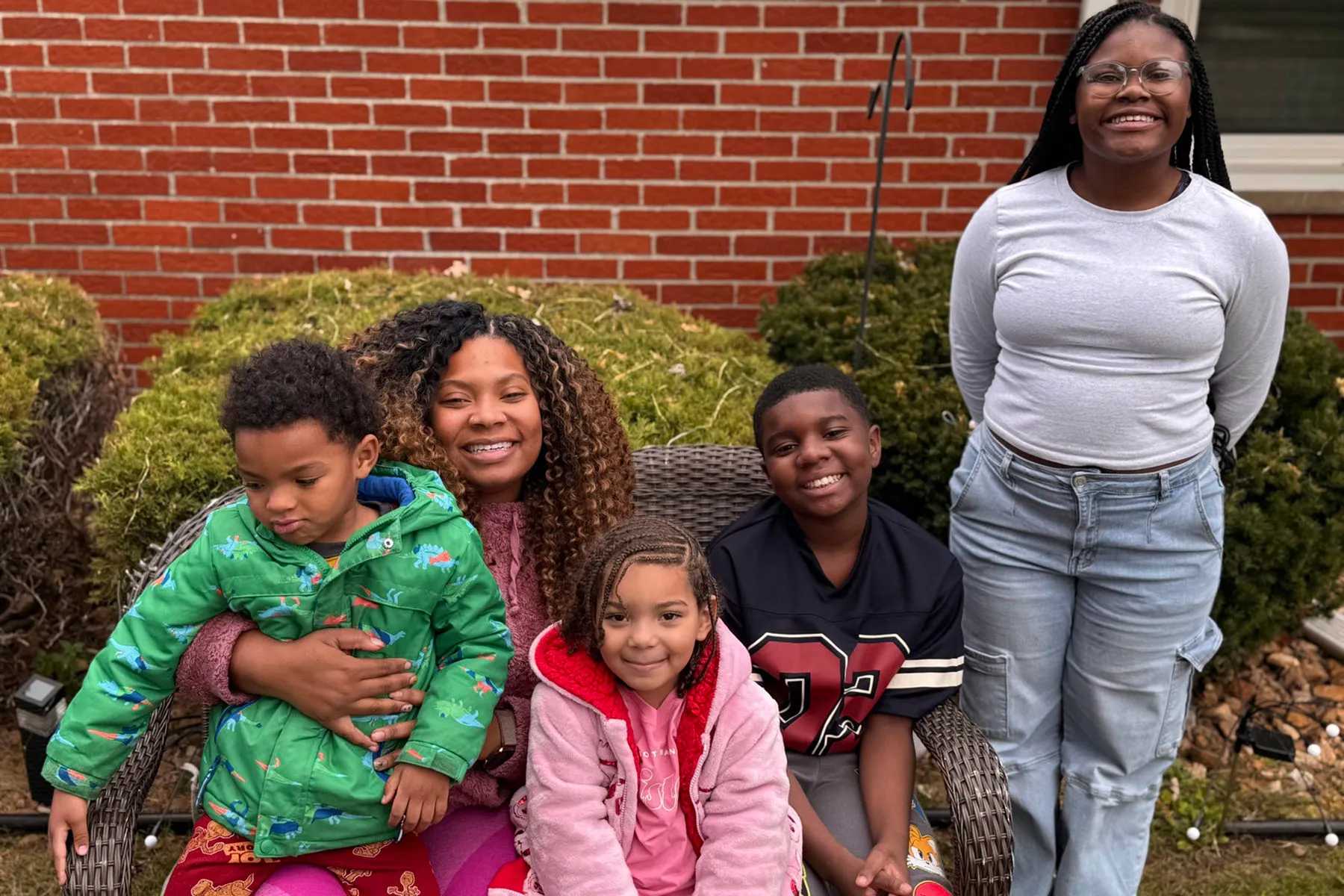Copyright The 19th*

The government shutdown is entering its second month and there is no sign that Republicans or Democrats in Congress will be ceding ground anytime soon to bring it to an end. On Saturday, funding for the federal Supplemental Nutrition Assistance Program (SNAP) — which helps millions of lower-income women, older and disabled Americans feed themselves and their families — will run dry. For a single mother of four in Detroit, losing SNAP will upend the tenuous balance between caregiving and survival. For a pastor at a church in Dallas where the majority of members are LGBTQ+, it will be an inflection point in a defining moment for congregants already scarred by the discriminatory policies of the Trump administration. For a woman who runs a food pantry in Chicago, it means staying the course — helping even if the government won’t. “This is what we do,” she said. “We’ll be here.” ‘There’s glory in the grit’ Nearly half of all single-parent households in the state rely on SNAP funding. The majority are headed by women. DETROIT — Before sunrise, the hum of a furnace fills the lower level of a modest home in Highland Park, Michigan. Upstairs, Nakia Middleton’s mother sleeps. Downstairs, Middleton, a single mother of four, is already moving, quietly and intentionally, before the chaos wakes. Her oldest child, 13, is first up. The 10-year-old trails behind, carrying her homemade lunch — “I like to make sure my kids eat real food made with love,” Middleton said. Her 4-year-old son and 3-year-old daughter wake to her voice: “Good morning, sunshine.” Life has changed for Middleton since the pandemic. “I had a good job, a stable place,” she said. “But when all the COVID layers came into play, I had to make a decision that worked for my family. I stayed home. I needed to be there for my kids.” Now, she lives with her mother and receives Supplemental Nutrition Assistance Program (SNAP) benefits, which help her buy food, and a child care allotment from the state. “I used to work for Rocket, for Charles Schwab, for Michigan First Credit Union,” Middleton said. “I haven’t always been on state assistance. But since the pandemic, this is how it’s been. How it’s had to be.” That tenuous balance between caregiving and survival — the need to nurture, protect and provide under so much strain — is being tested again. On November 1, funding for SNAP is expected to run out and millions of people across the country will go without food benefits. In Michigan, 13 percent of all households — roughly 1.4 million people — rely on SNAP to eat, as do nearly half of all single-parent households in the state, the majority of which are headed by women. In Wayne County, where Middleton lives, more than 430,000 residents depend on SNAP assistance. For parents like Middleton, the blow lands just months after Michigan narrowly avoided another crisis. The universal free school lunch program, which provides free breakfast and lunch for all public school students, was days away from being cut when talks over the state’s K-12 budget stalled past the July 1 deadline. Michigan legislators approved a state budget on October 3 that included about $24 billion for education, including money for free breakfast and lunch at school. “If free lunch were to be taken away, especially now that SNAP is being paused, that means my children that are enrolled in public school don’t eat,” Middleton said. “That’s scary because I can’t make breakfast, lunch, a snack and dinner every day for all of us.” She has leaned on the food pantry at Love Joy Church of God in Christ, where she has been a member since childhood. “I used to pack boxes for other families. Now I’m in the line myself,” Middleton said. “Food costs are too high. But I tell people, don’t be ashamed to use the food pantries. They’re crowded, but they’re here for us.” She’s heading back to her seasonal job at Amazon, a role she’s leaned on before to bridge the gaps. But for the first time this year, it carries a heavier purpose. Middleton will clock in at 3:30 a.m. and clock out by 8:30 a.m., working while her children sleep. “It’s not much, but it’ll help us get through Thanksgiving and Christmas,” she said. “We’ll make it work.” Her optimism is practiced, much like her strong foundation of faith. “I grew up on Third and Manchester,” she said, an area known for its high crime rate. “I’ve seen unthinkable things, but there’s glory in the grit. You can’t fight what’s happening with negativity. You have to lean in with love.” That faith connects her to advocates like Mothering Justice, a Detroit-based organization working at the policy level for mothers like Middleton. “At Mothering Justice, we have always made sure that mothers are supported with the tools they need to fight against the system that prioritizes politics over access to basic needs,” said Danielle Atkinson, the group’s national executive director. “Right now, we are connecting mothers to resources in their communities, pressuring lawmakers in Michigan to fight for our rights here and in Washington, and urging the administration to release emergency funds for SNAP. With SNAP frozen, families are facing empty refrigerators going into the holiday season. No one should have to live like this, especially when the federal government has the power and resources to prevent it.” For Middleton, the policy isn’t a line item. It’s dinner. It’s her son’s speech therapy. It’s her church’s food line and the freezer she’s trying to keep full. — Ebony JJ Curry, reporting fellow ‘This is a defining moment’ A pastor is trying to mitigate what’s expected to be a devastating blow against vulnerable communities amid the government shutdown. DALLAS — For days, the Reverend Dr. Neil G. Thomas has watched people arrive in droves at Cathedral of Hope to receive food. Some are regulars that he’s known for years. As the government shutdown drags on and funding for SNAP is about to expire, Thomas has also begun to notice new faces. Cathedral of Hope is home to more than 4,000 people in the Dallas area. A majority of them are members of the LGBTQ+ community, making it one of the most inclusive churches in the world. Thomas sees the looming threat of a hunger crisis as more than a government failure. To him, it’s a watershed moment — a deliberate encroachment on the most basic of rights. And the impact, he said, won’t be evenly spread. “I think it is a defining moment,” he said. “I think that we’ve been moving towards defining moments in our country — between the haves and the have-nots, between the rich and the poor, between people of color and White folks. This is a defining moment and I think that we will be judged accordingly.” If federally funded food assistance programs do lapse, the fallout is expected to be immediate, and he worries that the consequences will be too significant and far-reaching to remedy. “Once some of these safety nets get removed,” he said, “it’s hard to put them back into place.” LGBTQ+ people are a uniquely vulnerable group and have been a main target of discriminatory policies by the Trump administration. The compounding effect of food insecurity, Thomas said, will only make marginalized individuals like members of his own congregation more susceptible to harm. “If you don’t have in the hierarchy of needs, if you don’t have shelter and you don’t have food, and then you have fear on top of that, the ongoing trauma becomes a paralyzing effect and sees itself in homelessness, drug and alcohol addiction, other mechanisms by which we use to cover up pain,” he said. Cathedral of Hope, which is part of the United Church of Christ, has been trying to mitigate the impending harm of the suspension of SNAP benefits. Thomas knows, however, that this is only a temporary solution. “We’re gearing up to step up, expanding our services and doing our absolute very best to make sure that the food-insecure folks, whether they be homeless or facing SNAP and WIC reductions as well as folks in our own congregation who have not received paychecks, to ensure that our folks are served to the very best of our ability and we know that that’s going to extend us,” Thomas said. As the congregation’s spiritual leader, he has been forced to confront several frightening possibilities. One is that the level of need among Dallas residents might eventually surpass what the church is able to provide. “I think our biggest worry is we’re not gonna have enough,” he said. “I think my secondary worry is that people will feel embarrassed about having to ask for help. And so we’re trying to make pathways that ensure that those folks who you know have a sense of embarrassment for asking for help can ask it in such a way that they’re not being shamed.” The church has taken a “no questions asked” approach. To receive food, there is no mention of one’s employment status and no consideration given one way or another based on a person’s immigration status. “We’ve released a QR code that people can respond to anonymously and then actually receive food in a way that is done within privacy and as much confidentiality as possible,” he said. “We want to reduce any areas of shame or guilt or stigma of receiving food.” What has been especially devastating for Thomas has been witnessing his religion being used as a vehicle to discriminate against others. “Our faith is not an easy faith,” he said. “Our faith is a journey of discovery and finding ways in which we use privilege to the benefit of others, not privilege to yield power over others.” — Lauren Nutall, reporting fellow ‘It’s looking out for someone who’s in need’ As benefits face expiration, volunteers and visitors at the Woodlawn Fresh Food Market in Chicago lean on each other to meet rising demand. CHICAGO — At the Woodlawn Fresh Food Market on the South Side of Chicago, the line begins forming long before doors open, sometimes as early as 6 a.m. Each Thursday, dozens of community members gather outside the First Presbyterian Church of Chicago to pick up fresh produce, pantry staples and just as importantly, to see familiar faces. Gail Robinson has run the market for the last five years. A former dietician, she now dedicates part of her week to organizing the market and coordinating its numerous volunteers, who range from high school students to retired folks looking to keep busy. Woodlawn is a predominantly Black neighborhood, with many working single parents and elders. On Thursday morning, all hands were on deck as funding for the food assistance program known as SNAP is about to expire. “People are taking it really seriously,” Robinson said. “We’re just hoping that as the lines get longer, that people are patient.” Robinson first got involved with the market as a way to give back to her community. She said the mission has always been about more than just handing out groceries. “It’s looking out for someone who’s in need,” Robinson said. “You know the resources are there, but sometimes people just don’t know that there is help available. Or some people have their own impression of a food pantry. That’s why we switched our name to the Fresh Food Market. We added some dignity to it.” The market operates in partnership with the Greater Chicago Food Depository, a food bank that services 850 pantries, soup kitchens and shelters across Cook County. As the federal shutdown continues, both pantry staff and guests say the market is under growing strain. Last week, the market served 190 people in just two hours, Robinson said, way more than usual. Demand is only expected to go up. Man-Yee Lee, the food depository’s communications director, said the organization is doing all it can to prepare for a surge in need. She described a two-tiered emergency response: first, maximizing deliveries to existing partners like Woodlawn, and second, setting up temporary Saturday distributions of prepackaged food boxes in neighborhoods with the highest numbers of recipients of SNAP. “With rising rent prices and food costs, families have already been struggling,” Lee said. “That’s why we really need SNAP programs to exist at the same time as emergency food response.” For many regular pantry visitors — or “guests,” as they are called — the market provides more than food. It’s a space of routine and care, where volunteers know names and check in on families. That sense of stability is part of what keeps Phyllis, a 60-year-old grandmother from Hyde Park, who declined to give her last name, coming back week after week. She began coming to the market four years ago, when her daughter gave birth to her second child. “Because of her work hours, she was not able to come,” Phyllis said. “At the same time with child rearing, child care, the expenses from that, this helped offset those expenses.” Her daughter’s job also prevented her from receiving SNAP, as her pay came in just $20 above the cutoff, Phyllis said. After giving birth to her fourth child a few days ago, she was hoping to recertify, but will now have to wait until after the shutdown is over. Phyllis made it her commitment to help with food security and keep all her grandchildren fed and healthy. “So I’m grateful for the pantry. This one is such a need right now, it really is,” Phyllis said. Lee said the food depository’s partners are doing all they can to prepare, especially Woodlawn. “We will always be here for our pantries and neighbors,” she said, but warned that “food banks and food pantries are already stretched thin.” For now, Robinson said she’s focused on keeping the market running smoothly and helping everyone get served. “We have really personal relationships with our clients. We have a group of clients that we service, and this is what we do. We’ll be here,” Robinson said. — Gabriella Gladney, reporting fellow



